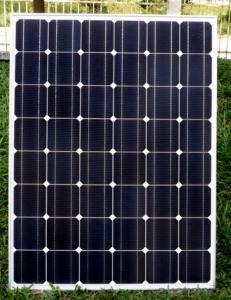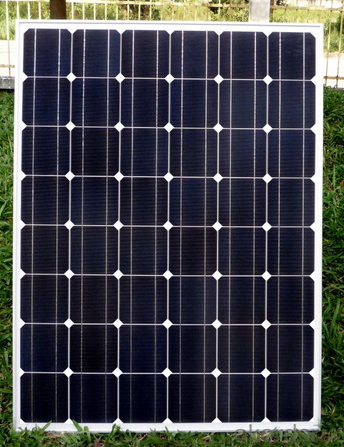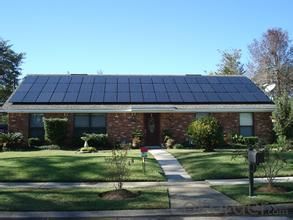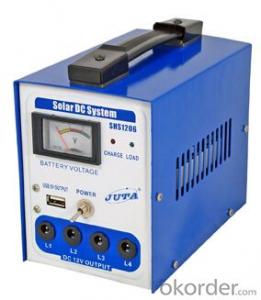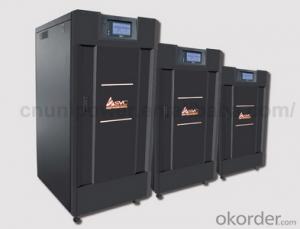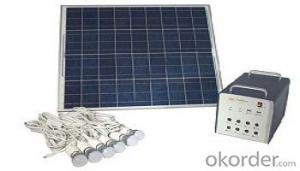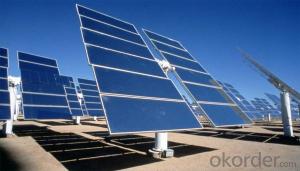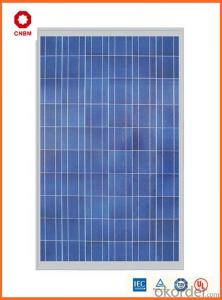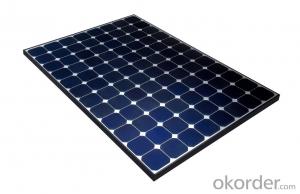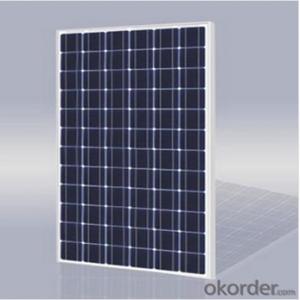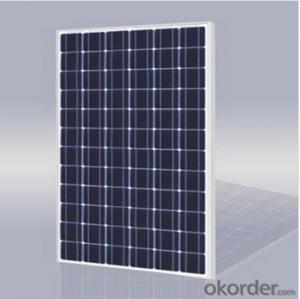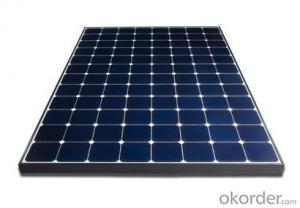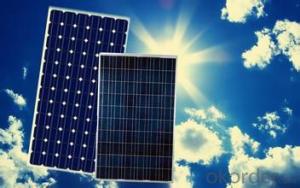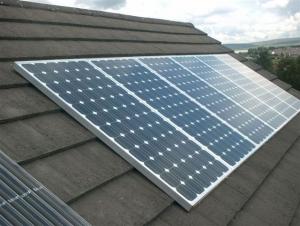Baywa Solar Energy Systems 35.5kw CNBM Monocrystalline Silicon Panel for Home Use
- Loading Port:
- Tianjin
- Payment Terms:
- TT OR LC
- Min Order Qty:
- 50 watt
- Supply Capability:
- 1000 watt/month
OKorder Service Pledge
OKorder Financial Service
You Might Also Like
Specification
35.5KW CNBM Monocrystalline Silicon Panel for Home Using
Production description
Solar energy is radiant light and heat from the Sun harnessed using a range of ever-evolving technologies such assolar heating, photovoltaics, solar thermal energy, solar architecture and artificial photosynthesis.
It is an important source of renewable energy and its technologies are broadly characterized as either passive solar oractive solar depending on the way they capture and distribute solar energy or convert it into solar power. Active solar techniques include the use of photovoltaic systems
The large magnitude of solar energy available makes it a highly appealing source of electricity. The United Nations Development Programme in its 2000 World Energy Assessment found that the annual potential of solar energy was 1,575–49,387 exajoules (EJ). This is several times larger than the total world energy consumption, which was 559.8 EJ in 2012.
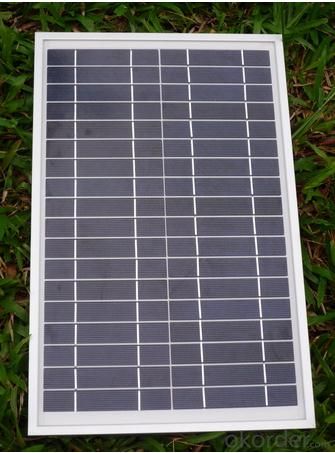
Feature
1.High conversion efficiencies resulting in superior power output performance.
2.Outstanding power output even in low light or high temperature conditions
3.Optimized design for ease of soldering and lamination
Physical characteristic
1. Rigorous quality control meets the highest international standards.
2. High-transmissivity low-iron tempered glass, strong aluminium frame.
3. Using UV-resistant silicon.
4. IS09001/14001/CE/TUV/UL
Packaging
26pcs in one carton 6pallets in 20foot container 14pallets in 40 foot container.
- Q: Can a solar energy system be installed in areas with high winds?
- Yes, a solar energy system can be installed in areas with high winds. However, it is crucial to take into account the wind load and design the system accordingly. Solar panels are designed to withstand various weather conditions, including strong winds, but they need to be properly mounted and secured to ensure their stability. Additionally, using aerodynamic mounting systems and tilt mechanisms can help reduce the impact of high winds on the solar panels. It is recommended to consult with a professional installer who can assess the specific wind conditions in the area and provide appropriate solutions to ensure the system's durability and performance.
- Q: How do solar energy systems connect to the electrical grid?
- Solar energy systems connect to the electrical grid through a process called net metering, where excess electricity generated by the solar panels is sent to the grid and credited to the owner's account. When the solar panels produce less electricity than needed, electricity is drawn from the grid to meet the demand. This bidirectional flow is achieved through an inverter that converts the direct current (DC) electricity from the solar panels into alternating current (AC) electricity compatible with the grid.
- Q: Can solar energy systems be used in off-grid locations?
- Yes, solar energy systems can be used in off-grid locations. Off-grid locations refer to areas that are not connected to the main power grid. Solar energy systems, such as solar panels, can generate electricity by harnessing the sun's energy and store it in batteries or use it directly for various applications. This makes solar energy a reliable and sustainable solution for powering off-grid locations, providing a clean and renewable source of energy.
- Q: Can solar energy systems be used in rural areas without access to the power grid?
- Solar energy systems are a viable and sustainable solution for rural areas without access to the power grid. They offer a reliable and sustainable source of electricity, making them ideal for off-grid communities. By capturing sunlight and converting it into usable electricity through photovoltaic technology, solar panels can power lights, appliances, and other electrical devices in homes, schools, healthcare facilities, and businesses. One of the main advantages of solar energy systems in rural areas without access to the power grid is their independence from traditional utility companies. These systems can operate autonomously, allowing communities to generate their own electricity without relying on external power sources. This is especially beneficial in remote areas where extending power lines from the grid can be costly and impractical. Furthermore, solar energy systems have a long lifespan and require minimal maintenance, making them suitable for rural areas with limited resources and technical expertise. Additionally, solar panels produce clean energy, reducing reliance on fossil fuels and minimizing the environmental impact. Moreover, solar energy systems can be combined with energy storage solutions, like batteries, to store excess electricity generated during the day for use at night or during periods of low sunlight. This ensures a continuous power supply even without direct sunlight. In conclusion, solar energy systems offer a reliable and sustainable solution for rural areas without access to the power grid. They provide reliable electricity, reduce dependence on fossil fuels, and offer long-term cost savings.
- Q: Can solar energy systems be used for powering agricultural machinery?
- Yes, solar energy systems can be used for powering agricultural machinery. Solar panels can generate electricity that can be used to power various agricultural equipment such as irrigation pumps, tractors, and crop dryers. This helps reduce the dependence on fossil fuels and lowers operating costs for farmers while promoting sustainable and eco-friendly farming practices.
- Q: Can solar energy systems be used in residential areas with homeowners associations?
- Yes, solar energy systems can be used in residential areas with homeowners associations. However, it is important to review and comply with the HOA's guidelines and regulations regarding the installation of solar panels. Some associations may have specific requirements or restrictions, such as design guidelines, placement restrictions, or approval processes. It is recommended to consult with the homeowners association and work together to find a solution that meets both the homeowner's desire for solar energy and the association's guidelines.
- Q: How does the efficiency of solar panels affect the performance of a solar energy system?
- The efficiency of solar panels plays a crucial role in determining the overall performance of a solar energy system. Higher efficiency panels are able to convert a greater amount of sunlight into electricity, resulting in increased energy production. This means that with more efficient panels, a solar energy system can generate more power and meet a greater portion of the electricity demand. One of the primary benefits of using highly efficient solar panels is that it allows for a smaller system size. Since more electricity is being produced per unit of panel area, fewer panels are needed to achieve the desired energy output. This not only saves installation space but also reduces the overall cost of the system. Additionally, a smaller system size means less maintenance and fewer potential points of failure, improving the reliability and longevity of the solar energy system. Furthermore, the efficiency of solar panels directly impacts the economic viability of a solar energy system. Higher efficiency panels generate more electricity, which can offset a greater portion of the energy consumption, resulting in reduced utility bills. In some cases, excess electricity can be fed back into the grid, allowing for net metering or even earning credits, further enhancing the financial benefits. A more efficient solar energy system can also provide a quicker return on investment, making it a more attractive option for homeowners and businesses alike. Moreover, the efficiency of solar panels has a significant impact on the environmental benefits of solar energy systems. By converting more sunlight into electricity, highly efficient panels can reduce the reliance on fossil fuel-based power generation, thus decreasing greenhouse gas emissions and contributing to a cleaner and more sustainable energy future. This positive environmental impact is crucial in combating climate change and minimizing the ecological footprint associated with energy consumption. In summary, the efficiency of solar panels directly affects the performance of a solar energy system. Higher efficiency panels lead to increased energy production, smaller system sizes, reduced costs, and improved financial returns. Moreover, they contribute to a more sustainable future by reducing reliance on fossil fuels and lowering greenhouse gas emissions. Therefore, investing in highly efficient solar panels is essential for maximizing the effectiveness and benefits of a solar energy system.
- Q: Can solar energy systems be used in powering research farms or agricultural laboratories?
- Yes, solar energy systems can certainly be used to power research farms or agricultural laboratories. Solar energy is a clean and renewable source of power that can be harnessed through the installation of solar panels. These panels convert sunlight into electricity, which can then be used to power various equipment and facilities. Research farms and agricultural laboratories often require a significant amount of electricity to operate, including lighting, heating, cooling, and powering agricultural machinery. By utilizing solar energy systems, these facilities can reduce their reliance on fossil fuels and decrease their carbon footprint. Solar energy systems can be installed on the roofs of buildings or on open land near the research farm or laboratory. The amount of solar energy generated will depend on factors such as the location of the facility, the size of the solar panels, and the amount of sunlight received. However, with advancements in solar technology, even areas with limited sunlight can still benefit from solar energy systems. In addition to being environmentally friendly, solar energy systems can also provide long-term cost savings for research farms and agricultural laboratories. Once installed, solar panels have a lifespan of 25-30 years, requiring minimal maintenance. This can lead to significant savings on electricity bills, especially in rural areas where grid connectivity may be unreliable or expensive. Furthermore, solar energy systems can provide a reliable source of power, especially during periods of peak demand or power outages. By incorporating battery storage systems, excess energy generated during the day can be stored and used during the night or cloudy days, ensuring a continuous power supply for research activities. Overall, solar energy systems are a viable and sustainable solution for powering research farms and agricultural laboratories. They offer numerous benefits, including reduced environmental impact, long-term cost savings, and reliable power supply. As the demand for renewable energy continues to grow, integrating solar energy systems into agricultural facilities can contribute to a greener and more sustainable future.
- Q: Can solar energy systems be used for powering remote monitoring systems?
- Yes, solar energy systems can be used for powering remote monitoring systems. Solar panels can generate electricity from sunlight, which can then be stored in batteries for use during non-sunny periods. This makes solar energy a reliable and sustainable power source for remote monitoring systems, allowing them to operate off-grid and in remote locations without access to traditional electrical infrastructure.
- Q: How does solar energy impact property values?
- Solar energy can have a positive impact on property values as it is considered a desirable feature by many homebuyers. Homes with solar panels typically sell faster and at a higher price compared to similar properties without solar installations. This is because solar energy can significantly reduce or eliminate electricity costs, making the property more affordable to maintain. Additionally, solar energy contributes to a greener and more sustainable lifestyle, which is increasingly valued by homeowners.
Send your message to us
Baywa Solar Energy Systems 35.5kw CNBM Monocrystalline Silicon Panel for Home Use
- Loading Port:
- Tianjin
- Payment Terms:
- TT OR LC
- Min Order Qty:
- 50 watt
- Supply Capability:
- 1000 watt/month
OKorder Service Pledge
OKorder Financial Service
Similar products
Hot products
Hot Searches
Related keywords
